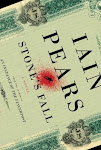
According to his bio, "Mathias B. Freese brings the weight of his twenty-five years of experience as a clinical social worker and psychotherapist into play as he demonstrates a vivid understand of - and compassion toward - the deviant and the damaged." I've read since that he wrote about half of these stories before he began his career, but the stories are flavored with his interest in psychology.
The book has some real bright spots. My favorite story was "Little Errands": the narrator has a compulsive disorder and the story is basically 4 pages of panic. Did she mail the letters, did they make it from the mail tray into the mail box, will the mailman pick them up, were there stamps on them...it made my skin crawl a little as I tried to imagine every little errand turning into this sort of enormous production. (I found it interesting, on a personal level, that I assumed the narrator to be a woman; looking back, the story doesn't indicate a name or gender.) I also found "I'll Make It, I Think" and "Herbie" very moving. The first is a story about a handicapped man and how he has dealt with his disabilities, naming his uncooperative body parts and dealing with his bitterness. I found "Herbie" terribly sad, a son being crushed by his father, even as his father tries to toughen him up.
The book also has dim spots. It's small - barely 100 pages - and many of the stories felt condensed and abbreviated. I found the language and phrases awkward and unattractive. I would find myself re-reading passages trying to parse their meaning. Even the stories I found moving were not truly pleasant reading; I was too often brought up short by a convoluted passage that conveyed its meaning with great difficulty, if at all.
I have The i Tetralaogy on my shelf, a gift from a generous blogger, and I am curious to see what Mr. Freese does in a longer format. My copy of Down to a Sunless Sea was an ARC; purchase your copy at Amazon.com.
The book has some real bright spots. My favorite story was "Little Errands": the narrator has a compulsive disorder and the story is basically 4 pages of panic. Did she mail the letters, did they make it from the mail tray into the mail box, will the mailman pick them up, were there stamps on them...it made my skin crawl a little as I tried to imagine every little errand turning into this sort of enormous production. (I found it interesting, on a personal level, that I assumed the narrator to be a woman; looking back, the story doesn't indicate a name or gender.) I also found "I'll Make It, I Think" and "Herbie" very moving. The first is a story about a handicapped man and how he has dealt with his disabilities, naming his uncooperative body parts and dealing with his bitterness. I found "Herbie" terribly sad, a son being crushed by his father, even as his father tries to toughen him up.
The book also has dim spots. It's small - barely 100 pages - and many of the stories felt condensed and abbreviated. I found the language and phrases awkward and unattractive. I would find myself re-reading passages trying to parse their meaning. Even the stories I found moving were not truly pleasant reading; I was too often brought up short by a convoluted passage that conveyed its meaning with great difficulty, if at all.
I have The i Tetralaogy on my shelf, a gift from a generous blogger, and I am curious to see what Mr. Freese does in a longer format. My copy of Down to a Sunless Sea was an ARC; purchase your copy at Amazon.com.






5 comments:
There were a few I didn't get, and a few that I wish were longer. I'll be reviewing this one soon. Great review!
--Anna
Diary of an Eccentric
Thank you for the review.
If you were to read the Tetralogy, I strongly urge you to read the essay at the end in which I give my intention and background material; it is a disturbing book. A recent review by Mayra Calvani is on Today.com and it captures the essence of the book remarkably well.
Kind regards,
Matt freese
I really enjoyed "Little Errands" as well. Some of the others had some interesting characters, but I felt that I needed more from them
I've read similar reviews - that the stories have great (and often disturbing) nuggets, but could be more fully developed.
Perhaps that's a device the author is using ... to have the story stay with the reader (who finishes it and fills in the details in his/her own head). I haven't read the book, so I'm really hypothesizing here!
Thanks for the review, Lisa.
interesting review. I have the book here somewhere...Library Thing says so...but for some reason it is not in my TBR pile. I must find it and give it a look!
Post a Comment